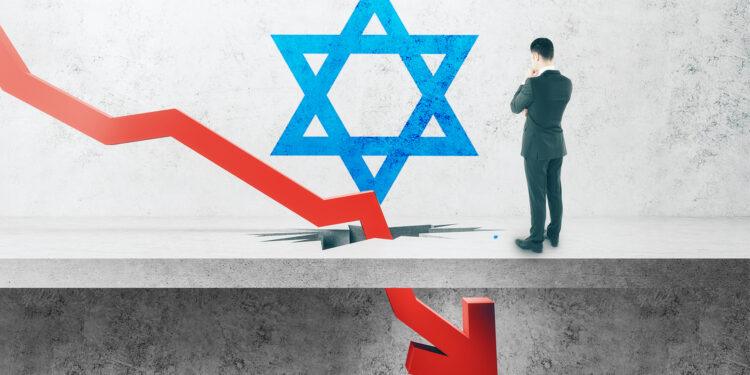Sectors of the Israeli economy have begun to await developments in the situation on the northern border with Lebanon, which has witnessed a steady escalation for nearly a month, amid fears that the limited daily clashes between Hezbollah and Tel Aviv will turn into an open war.
The majority of economic sectors in Israel are still suffering from the consequences of the ongoing war on the Gaza Strip since last October, most notably the tourism and construction sectors, and to a lesser extent the services and agriculture sectors.
Israeli fears
However, the greatest fear among the Israelis is Hezbollah’s declared target bank against strategic sites, which appeared in a video prepared by the party revealing precise details of the most important vital sites that it may target in any future war.
Going back to the 2006 war with Hezbollah, the economic and political repercussions had a severe impact on Israel at the time.
Today, the Israelis fear that the escalation of tension in the north into war means that the cost that Israel will pay will exceed the current cost caused by the war on Gaza.
Electricity sector
In the electricity sector, for example, Shaul Goldstein, CEO of Noga Electricity Systems Management, revealed that a 72-hour power outage in Israel would make life impossible, and that Hezbollah could easily hit the Israeli grid.
These statements, which Goldstein issued last week at an economic event, received widespread resonance, reaching the point of calling for his removal from his position.
Israel does not currently suffer from an electricity shortage, although such a shortage may arise between 2028 and 2029, according to estimates by the Ministry of Energy.
At the same time, Israel suffers from a chronic problem in the energy industry, which is the failure to achieve the renewable energy production goals that the state has set for itself, according to what was reported this week by the economics newspaper Globes.
Israel also suffers from a central crisis in the energy sector, which makes it vulnerable to darkness if these facilities are attacked by Hezbollah.
Tourism and agriculture
Nine months after the war on the Gaza Strip, Israel is suffering from an 80% decline in incoming tourist traffic, according to data from the Israeli Bureau of Statistics.
The number of tourists who visited Israel in the first five months of this year reached 400,000 – including non-tourists for work purposes, for example – down from two million tourists during the corresponding period of 2023.
Dozens of international airlines are still suspending their flights to and from Israel due to the war, amid tourism’s aversion to Israel as a destination for them.
Given the premise of war in the north, Ben Gurion and Haifa airports will be among Hezbollah’s target banks, as appeared in the recent video that reveals the most important vital sites in Israel.
This means that the country will not be able to receive flights, whether civilian or military, at the northern and central airports, while Ramon Airport (south) remains able to operate, but it has also fallen within the targets of the Palestinian resistance in the Gaza Strip.
As for agriculture, the settlements adjacent to the Gaza Strip, or as the Israelis prefer to call them “the food basket of Israel,” are still closed military zones, despite the government’s encouragement of settlers there to return to their homes.
But the major crisis that Israel is suffering from today is that the northern regions, which are characterized by their fertile soil, have become, since last October, military zones or unexploitable lands in light of the mutual bombing with Hezbollah.
Israeli frustration
Although the war in the north has not begun, business leaders in Israel are frustrated with the administration of Prime Minister Benjamin Netanyahu, which prompted some of them to consider entering politics to compete with him.
Last week, a forum of the 200 largest businessmen in Israel, consisting of owners, presidents and CEOs of major companies, called for early elections to “save Israel from a deep economic crisis.”
The forum in Tel Aviv included half of the companies listed on the Tel Aviv Stock Exchange (TA-35) index, including the CEOs of the largest banks operating in Israel.
These calls come as the Central Bank estimates that the war on Gaza alone, without Hezbollah, will cost about $67 billion until 2025, or approximately 15% of the annual gross domestic product.
While the per capita GDP decreased in 2023 for the first time in 8 years, according to the International Monetary Fund, while the government is heading this year to record one of the largest deficits in its budget this century in 2024.



